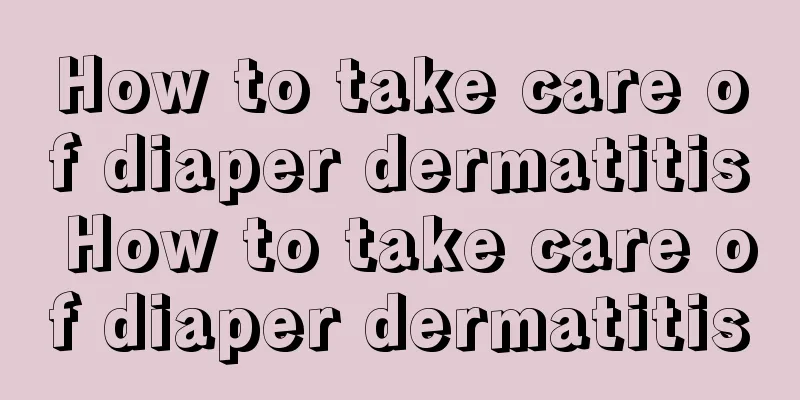Why does the baby drool frequently? How to take care of the drooling baby?

|
As babies grow, they will drool constantly, so you always need to help them wipe it clean from time to time. Why do babies drool so frequently? How to take care of babies who drool? Reasons for baby droolingNormal physiological phenomenon: A newborn baby actually does not secrete much saliva, only about 50CC, which is just enough to moisten the mouth. When the baby is 3 to 4 months old, as the physiological needs develop and the baby grows and develops, about 200CC of saliva can be secreted a day.The salivary glands, which are composed of the parotid glands, sublingual glands, and submandibular glands, are the source of the baby's saliva. After most babies are 3 to 4 months old, as the salivary glands develop gradually, the glandular secretion becomes more and more developed.Sucking and swallowing are not coordinated yet: For babies who are entering the stage of complementary food feeding, the coordination of oral muscles begins to progress from simple sucking to more complex chewing and swallowing. When the baby's swallowing function is not yet proficient and the oral suction and swallowing muscle function is not coordinated, saliva can easily overflow from the baby's shallow mouth.More feeding stimulation: In order to meet the nutritional needs, babies must start to be exposed to foods other than breast milk or formula milk after they are about 4 months old. As the food sources become more and more diverse, the baby's curiosity increases, and he will suck his fingers or put objects in his mouth. The saliva line in the baby's mouth will also be stimulated from multiple aspects, secreting more saliva.Baby drooling effectLubrication prevents tooth inflammation: When the baby's teeth first grow, the gum tissue will inevitably be swollen and painful, and the tooth tips are relatively delicate. At this time, the baby's saliva can act as a lubricant and prevent the occurrence of inflammation symptoms around the teeth.Keep the mouth clean: The baby's saliva can keep the mouth moist and clean, and can also clean the baby's newly grown teeth to prevent the formation of tooth decay.Promote the development of taste buds: Saliva can promote the development of baby's taste buds, thereby increasing the baby's appetite; it can also promote the activities of lips and tongue, so that the baby can speak as soon as possible; it can also promote the maturity and perfection of swallowing movements.Clothes need to be changed frequently: If your baby drools frequently, not only will his face get dirty, but his clothes will also be dirty and his whole body will be wet, so you need to change his clothes frequently.Skin damage due to contact: Since saliva is acidic and contains some corrosive digestive enzymes, and the baby's skin is relatively tender, once saliva flows out and contacts the baby's mouth corners, cheeks and other parts, symptoms such as redness will appear over time.Baby drooling careDon’t pinch the cheeks casually: Be careful not to pinch your child’s cheeks casually, so as not to stimulate the salivary glands and cause more drooling.Saliva irritates the skin: Saliva is weakly acidic and can irritate the baby's skin, so the skin around the baby's mouth should be washed frequently with warm water. You can also apply some baby-specific skin care cream, and remember to change the bib frequently.Improvement of allergy with medication: If the baby's skin has become red and swollen, apply skin ointment to the affected area twice a day according to the doctor's instructions. Obvious improvement will be seen after 2 to 3 days.Regular oral examinations: Take your child for regular oral examinations for timely diagnosis and treatment.Abnormal growth and development: If a child is over two years old and continues to drool, especially if there are some growth and development abnormalities, he or she should be examined and evaluated by a doctor to see if there are any abnormalities in the muscle and nervous system or the facial and oral structure. |
<<: What is the visual development process of a newborn baby?
Recommend
How to add complementary food to babies with allergies? Mothers must pay attention to these points
You can start adding complementary foods to your ...
What causes itchy stretch marks? What should I do if they cause itchy stretch marks?
What causes itchy stretch marks? Itchy stretch ma...
What should newborns wear when sleeping in winter? Should newborns be wrapped up when sleeping?
Newborns have just come out of their mothers'...
How many days can a newborn baby be exposed to the sun? How long can a newborn baby be exposed to the sun?
Newborns need calcium supplements after birth. Ta...
Will blood clots during menstruation cause infertility? Will blood clots during menstruation cause infertility?
Blood clots during menstruation are something tha...
Why are pregnant women afraid of heat? Is it normal for pregnant women to be afraid of heat?
I wonder if expectant fathers have noticed that w...
Can roasted oranges cure children's coughs? Some points to note when roasting oranges to cure coughs
Injections and taking medicines are nightmares fo...
How to diagnose bronchitis in children? Do children with bronchitis need to be hospitalized?
After the baby is born, the body's immunity i...
Can pregnant women eat Baxian fruit? Who are not suitable for eating Baxian fruit?
Baxian fruit is not a fruit, but a processed deli...
What are the symptoms of growing pains in children and how to relieve them
Growing pains in children are not a disease and w...
What should I do if my newborn's navel is inflamed?
Newborn babies are not fully developed and are ea...
Can pregnant women eat mutton rolls bought from supermarkets? Can pregnant women eat frozen meat?
A healthy diet is very important for pregnant wom...
What should I do if I suffer from insomnia during pregnancy? How to treat insomnia during pregnancy?
Everyone should have heard in life that pregnant ...
How long does it take to quit smoking before you can have a child? How long does it take to be considered successful in quitting smoking?
Smoking is a bad habit that is very harmful to a ...
Can children with coughs be vaccinated? Can children with coughs be given milk?
Children are prone to getting sick easily because...









